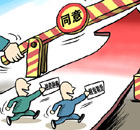Opinion
Dismantle urban-rural divide
By Zhang Chuanwen (China Daily)
Updated: 2010-02-11 15:09
 |
Large Medium Small |
The first formal document of the new year, dubbed the "No 1 Document" and which has been released every year since 2004, presents the rural policies of the Communist Party of China and the State Council over issues of agriculture and peasants. The most attractive aspect in the document this year is the aim to "empower and benefit rural residents, and facilitate the allocation of resources into the countryside."
Attracting economic resources into rural areas is crucial for its development. Since the 1990s, urban development has consumed most of the financial credits, and consequently it has become more and more difficult for rural residents to obtain loans to the detriment of the rural economy. The No 1 Document encourages the development of village and township banks, small corporate lenders and rural credit unions. It seeks an orderly growth of micro-credit projects. It aims to alleviate the dearth of financial institutions and enhance the seeding of growth in rural areas.
Though rural development is crucial, the government must make more efforts to promote the rural inhabitants' move to urban areas. Consensus should be reached to accelerate the urbanization process, and there is an urgent need for policies that accomplish this goal.
An autarkical small-peasant economy of more than 2,000 years in China has proven that it is impossible for rural households to become rich mainly through agriculture. To resolve this issue, we must think beyond rural areas. When peasants settle down in cities and become urbanized, the issue can be finally resolved.
Precedence by other countries offers good references. After World War II, in most Western countries, the proportion of rural populations plunged from over half of the total population to below a tenth in just three decades. The total scale of the urbanization in the West is no smaller than that of China. After three decades of economic reform and rapid growth, however, around 60 percent of Chinese still live in rural areas, an abnormality from the Western experience.
A glimpse of light can be found in the document, which emphasizes resolving the issue of "new generations of migrant workers from rural areas". It's the first time in a government document that the phrase has been used, indicating that the government has begun to show concern for the migrant workers born in the 1980s and '90s, which account for 60 percent of all workers from rural areas.
In fact, after the abolition of the agricultural tax and exemption of many official fees on rural inhabitants, tension in rural areas has eased. With the flow of a staggering number of peasants into cities, the issue of migrant workers has come to the fore.
The current policies, which contain elements on segregation between rural and urban residents, are challenged by new generations of migrant workers. Contrary to their parents, new generations of migrant workers came to cities and worked in factories as soon as they finished school. They do not even know how to till the land. Except for the rural hukou (permanent residency permit), they don't have the characteristics of peasants and a return to rural areas is unlikely. They usually live in compact communities with many inhabitants. Consequently, discontent easily spreads. Hence, if they can't settle down and enjoy a decent life in cities, a chasm will split China's urban society, and before long, this social stratum may form the most dangerous time-bomb.
A recent farce in Dongguan, Guangdong province, could serve as an alarm. A barely clad migrant worker born in the 1980s, took to the streets gripping two axes and hacked the gate of a construction company. Police subdued him a few hours later. In his own words, his motive for the bizarre behavior was simple: "I have felt like a good-for-nothing my whole life, and so I want to make a big thing". Though his deed was an uncommon and isolated case, the feeling of resentment and desperation is typical among the deprived migrant workers in China.
To solve the thorny issue of migrant workers, the No 1 Document calls for profound reform of the hukou system. The threshold to obtain a hukou in medium-and small-sized cities as well as towns will be lowered, and rural residents eligible for urban hukou should be facilitated to settle down in cities and enjoy the same rights as urban residents.
It is a realistic target that is not surprising at all. In fact, the threshold in medium and small cities is lowering. What migrant workers care most is not the urban hukou, but equal social and educational rights. Since only rural hukou holders are allowed to own homesteads and farmland, having rural hukou is not a completely bad thing. Hence, the key to promoting urbanization is not lowering the threshold for a hukou, but dismantling the entire fence of the hukou system and offering equal rights to every citizen regardless of where he or she lives. The children of migrant workers should have the equal right to attend schools in cities. The government should allow migrant workers to enjoy urban benefits.
| ||||
China cannot afford to develop at the cost of their rights and interests. This model of development, however, is not sustainable. Sustainable modernization must benefit both rural and urban residents.
Development in the rural areas should not be confined to upgrading infrastructure in the rural areas. Only an active urbanization policy can finally solve China's long-lasting rural problems.
The writer is an editor with the Beijing News













